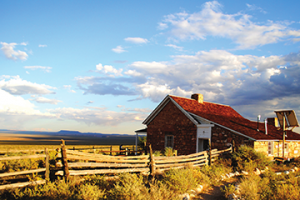Approach
Sustaining the ecological and human communities of the Southwest becomes increasingly challenging as global environmental change accelerates. Robust science is needed that provides solutions to critical conservation and sustainability challenges, including effective technology transfer among scientists, decision-makers, and practitioners. Working toward conservation solutions across broad landscapes and throughout urban, rural, and tribal communities, NAU’s Center for Adaptable Western Landscapes leverages cutting-edge research in conservation genetics, population ecology, community ecology, landscape ecology, evolution, genecology, biological invasions, ecological restoration, plant propagation, and environmental humanities.
We combine this expertise with a regional network of land managers and community groups via collaborative conservation work and stakeholder engagement. We carry and grow our reputation as the regional leader in landscape-scale conservation and adaptation. The Center for Adaptable Western Landscapes will focus on the Colorado Plateau and Southwest as geographic regions of high biological and cultural diversity currently undergoing severe, extensive environmental change and subsequent strong sustainability challenges. With a core social component that includes widening community participation in conservation challenges, developing capacity and training the next generation of conservation practitioners, and understanding cultural variation in conservation ethos, the Center for Adaptable Western Landscapes is positioned to reach tens of thousands of people across millions of acres and improve the interactions between humans and nature towards sustainability.
Mission

The mission of the Center for Adaptable Western Landscapes is to promote robust scientific research to enhance sustainable management of ecological populations, communities, and landscapes and develop solutions to ecological problems across the American Southwest and Colorado Plateau. Through interdisciplinary, integrative research that spans scales from genes to landscapes, we bring NAU expertise and resources into partnership with agencies, policymakers, and land managers. We value inclusion of indigenous perspectives and priorities, with a focus on environmental justice as well as inclusion of peoples from diverse backgrounds into the research, collaboration, outreach, and training. We meld evolutionary and community ecology, socio-ecology, environmental humanities, collaborative design and planning, and large-scale implementation of applied research to measure and enhance the adaptive capacity of human and natural systems in the face of global change. Our overarching goal is to promote sustainability of the biodiversity and human communities of the Colorado Plateau and Southwest in the context of rapid changes occurring at a global scale.
History
The Center for Adaptable Western Landscapes (CAWL) was established on May 5, 2020, as an NAU Research Center under the Policy on the Establishment of Research Centers, Public Service Centers, and Institutes at Northern Arizona University. CAWL was designed to capitalize on the great legacy of achievement of the Merriam-Powell Center for Environmental Research (MPCER) and the Land Conservation Initiative (LCI). CAWL will synthesize these two streams of success, preserving much of the very best of both, and creating new synergy to achieve even more.
Created in 1998, the MPCER began as a grassroots interdisciplinary research group under the direction of Dr. Tom Whitham and formally recognized as an NAU Research Center in 2001. Promoting applied and basic research on the Colorado Plateau and adjacent regions was the mission of the MPCER. Through its cross-disciplinary research programs, spanning genes to ecosystems, the MPCER has helped expand the scientific knowledge needed to develop effective strategies for meeting environmental challenges, including climate change, invasive species and biodiversity loss.
Under the leadership of Dr. Thomas Sisk, LCI was establishes as an NAU Research Center with the chief objective of providing enhanced capacity for engaging the best conservation science in public engagement, deliberation, and the development of socially viable solutions to emerging environmental challenges. LCI advanced three program elements—applied ecological research, collaborative planning, and education and training—that, together, tie policy innovation to solid scientific research, fostering social change and environmental justice to reach this objective.